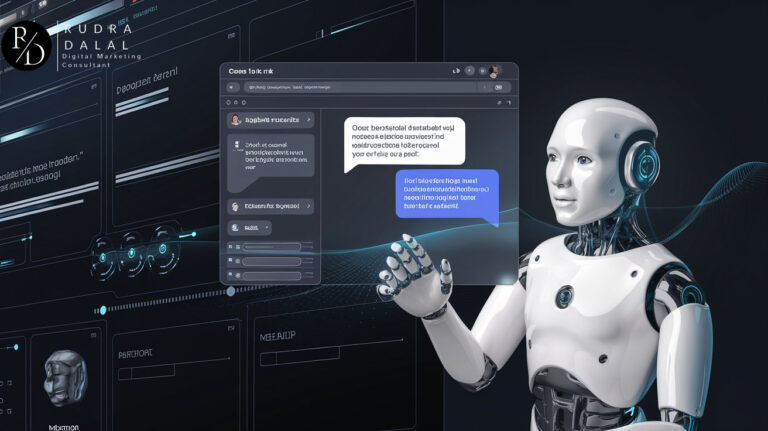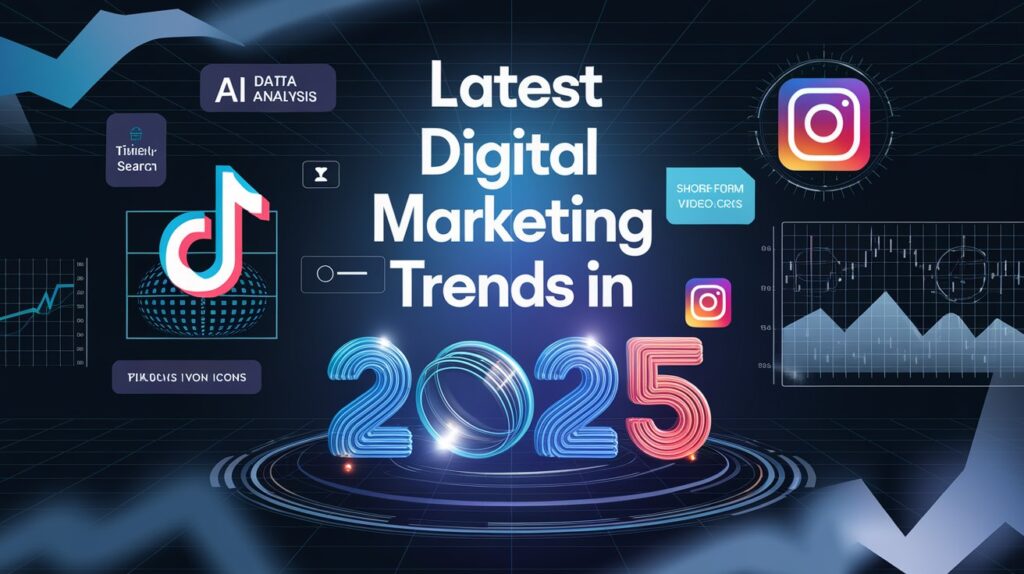Digital marketing is evolving rapidly, and staying updated with the latest trends is critical for any business owner looking to remain competitive. In 2024, digital marketing will be defined by advanced technologies, customer-centric approaches, and data-driven decisions. Whether you run a small business or a large enterprise, understanding these trends will help you fine-tune your strategy and drive growth in this dynamic landscape.
In this blog, we will explore the Latest digital marketing trends of 2025 that every marketer should be aware of. By staying ahead of these developments, you’ll be able to create more effective campaigns, engage your target audience, and maximize your return on investment (ROI).
1. AI and Machine Learning Revolutionizing Digital Marketing

Artificial Intelligence (AI) and machine learning are no longer just buzzwords—they are transforming how businesses approach digital marketing. In 2025, AI will continue to play a major role in areas like:
Personalization
Chatbots and Customer Support
Predictive Analytics
AI allows businesses to deliver hyper-personalized experiences to their customers. From product recommendations to personalized email campaigns, AI helps create a tailored experience for each user. This leads to better engagement and higher conversion rates.
AI-powered chatbots are becoming more advanced and can now handle complex customer queries. In 2025, businesses will rely heavily on chatbots to provide instant customer support 24/7, improving user experience and reducing operational costs.
AI-driven predictive analytics enables businesses to analyse customer behaviour and predict future trends. This helps marketers make data-driven decisions and optimize their strategies for better results.
Pro Tip for Business Owners
Start incorporating AI tools like chatbots and personalized recommendation engines into your digital marketing strategy to provide a better user experience and boost conversions.
2. Voice Search Optimization: The Next Big SEO Challenge
Voice search is rapidly growing, thanks to the increasing use of virtual assistants like Google Assistant, Alexa, and Siri. By 2025, more than half of all searches are expected to be voice-based. This presents a significant opportunity for businesses to optimize their content for voice search.
Key points to consider when optimizing for voice search:
Use Conversational Keywords
Featured Snippets and Position Zero
Unlike traditional text-based searches, voice searches are more conversational. For example, someone might type “best digital marketing agency in Ahmedabad” but ask, “Which is the best digital marketing agency near me?” Make sure your content reflects this shift by using long-tail, conversational keywords.
A large portion of voice search results comes from featured snippets (position zero) on Google. Focus on providing clear, concise answers to commonly asked questions to increase your chances of being featured.
Pro Tip for Business Owners
Review your current content and optimize it for voice search by focusing on FAQs and natural, conversational language that matches how people talk.
3. The Rise of Short-Form Video Content
Video content has been a powerful tool for digital marketers for years, but in 2025, short-form videos are expected to dominate even more. Platforms like TikTok, Instagram Reels, and YouTube Shorts have become immensely popular, and businesses are leveraging these formats to capture attention quickly.
Why short-form video content works:
Increased Engagement
Viral Potential
Low Production Cost
With shrinking attention spans, short-form videos (typically 15-60 seconds long) are more engaging and easier to consume.
Short, impactful videos have a higher chance of going viral, helping brands reach a broader audience.
Short-form videos are often easier and cheaper to produce, making them an excellent option for small businesses with limited marketing budgets.
Pro Tip for Business Owners
Experiment with platforms like Instagram Reels and TikTok by creating short, engaging videos that highlight your products, services, or behind-the-scenes content to build a stronger connection with your audience.
4. Omnichannel Marketing: Connecting the Dots Across Platforms
In 2024, having a presence on just one or two platforms is no longer enough. Consumers now expect seamless experiences across multiple channels, whether it’s your website, social media, email, or in-store. Omnichannel marketing is about providing a cohesive brand experience across all touchpoints.
Key strategies for successful omnichannel marketing:
Consistency
Integration
Customer Journey Mapping
Ensure your brand message, tone, and visuals remain consistent across platforms, from social media to your website and even email marketing.
Use tools that integrate your marketing efforts, allowing you to track customer interactions across platforms. This helps in delivering a more personalized experience, no matter where the user interacts with your brand.
Understand the different stages of your customer’s journey (awareness, consideration, decision) and create content tailored to each stage across different platforms.
Pro Tip for Business Owners
Leverage omnichannel marketing tools like HubSpot, Mailchimp, or Google Analytics to track customer touchpoints and create a cohesive experience that leads to higher conversions.
5. Influencer Marketing Evolving into Partnership Marketing
Influencer marketing has been booming in recent years, but in 2025, the focus will shift from one-time influencer campaigns to long-term partnerships. Brands are realizing the value of building sustained relationships with influencers who can authentically promote their products over time.
What’s new in influencer marketing for 2025:
Micro and Nano Influencers
Authenticity Over Perfection
Performance-Based Campaigns
Instead of going after celebrities, businesses are collaborating with micro (10k-50k followers) and nano (less than 10k followers) influencers who have highly engaged, niche audiences.
Consumers are becoming more sceptical of overly polished, perfect influencer content. Brands that embrace authenticity, with influencers sharing real-life stories and experiences, will stand out.
Instead of paying influencers upfront for posts, brands are increasingly offering performance-based partnerships, where influencers earn commissions based on the sales or engagement they generate.
Pro Tip for Business Owners
If you’re on a budget, focus on building long-term relationships with micro-influencers in your niche. Their smaller but more engaged audiences often lead to better results than bigger influencers.
6. The Power of User-Generated Content (UGC)
User-Generated Content (UGC) refers to any form of content—images, videos, reviews, testimonials—created by your customers rather than your brand. UGC has become a key trend in 2025 as consumers trust other consumers more than they trust brands.
Why UGC is essential for digital marketing:
Builds Trust
Boosts Engagement
Cost-Effective
UGC provides social proof, showing potential customers that real people are enjoying your product or service.
UGC encourages more interaction from your audience, as people are more likely to engage with authentic content created by their peers.
UGC is an inexpensive way to create content, as your customers do the work for you. All you need to do is encourage them to share their experiences with your brand.
Pro Tip for Business Owners
Create incentives for your customers to generate content for your brand. You can offer giveaways, discounts, or feature their posts on your social media to encourage participation.
7. Zero-Party Data: The Future of Ethical Data Collection
As consumers become more concerned about privacy, the way businesses collect data is changing. In 2025, the focus will be on zero-party data—information that customers intentionally and proactively share with a brand, such as their preferences, purchase intentions, and feedback.
Benefits of zero-party data:
More Accurate Personalization
Builds Trust
Compliant with Privacy Laws
Because zero-party data is shared directly by the customer, it’s more accurate and allows for highly personalized marketing campaigns.
By being transparent about data collection and giving customers control over what they share, businesses can build trust and foster long-term loyalty.
As privacy regulations like GDPR and CCPA become stricter, zero-party data helps businesses stay compliant while still collecting valuable insights.
Pro Tip for Business Owners
Implement interactive quizzes, surveys, and preference centers where customers can share their preferences directly with you, ensuring you’re collecting ethical, actionable data.
8. Sustainability in Digital Marketing
Consumers are becoming more eco-conscious, and this shift is reflected in their buying decisions. Brands that prioritize sustainability and eco-friendly practices are gaining a competitive edge. In 2025, businesses need to incorporate sustainability into their digital marketing strategies.
Ways to promote sustainability through digital marketing:
Eco-Friendly Content
Sustainable Web Design
Partner with Green Influencers
Share your brand’s sustainability initiatives, such as reducing your carbon footprint or using eco-friendly packaging. Transparency is key—consumers want to see real actions, not just greenwashing.
Minimize your website’s energy consumption by optimizing images, reducing unnecessary code, and using eco-friendly hosting services.
Collaborate with influencers who advocate for sustainable living to reach an audience that cares about eco-conscious choices.
Pro Tip for Business Owners
Highlight your brand’s commitment to sustainability in your digital marketing campaigns. Consumers today are more likely to support businesses that prioritize the environment.
Conclusion: Embrace the Future of Digital Marketing in 2025
Digital marketing is more dynamic than ever, and keeping up with the latest trends is essential for staying competitive. From AI-driven personalization to voice search optimization, the landscape of digital marketing in 2025 is full of opportunities for businesses to connect with their audience in more meaningful ways.
For business owners and digital marketers, embracing these trends will help you stay ahead of the curve. Whether it’s leveraging short-form video content, building long-term influencer partnerships, or focusing on sustainability, the future of digital marketing is all about innovation and customer-centric strategies.
